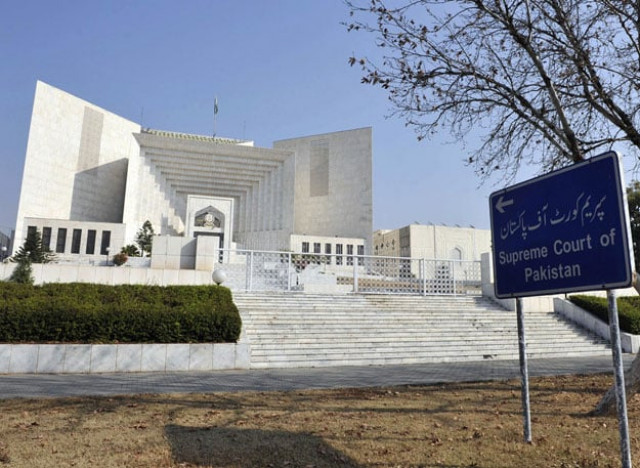Repatriation from BD: ‘Incensed’ petitioner might approach ICJ
Last week SC dismissed petition seeking repatriation of 300,000 Biharis.

Supreme Court had dismissed the plea with the observation that neither the petitioner had any standing nor was it a registered organisation in the eyes of law. PHOTO: AFP
Pakistan’s top court last week threw out a petition seeking repatriation of tens of thousands of Pakistanis stranded in Bangladesh. But the petitioner is refusing to give in. The Stranded Pakistanis General Repatriation Committee (SPGRC), which was pursuing the case, is now considering other options for bringing 300,000 Pakistanis of Bihari descent back home.
The committee’s attorney Rashidul Haq Qazi said his clients were exasperated by the dismissal of their petition by the apex court on the basis of locus standi (having no legal standing). Qazi said he has advised his clients to approach the International Court of Justice (ICJ), the primary judicial branch of the United Nations, regarding implementation of the tripartite agreement between Pakistan, India and Bangladesh for normalisation of relations, which was signed on April 9, 1974, in New Delhi.
“They are considering my advice, as I have also offered my services to plead their case in the ICJ,” added Qazi.
About the possibility of filing a review petition, he said that the top court would not entertain the petition against its judgment because the scope of the review is very limited.
After brief proceedings on March 31, a three-judge bench of the apex court, headed by Justice Mian Saqib Nisar, had dismissed the plea with the observation that neither the petitioner had any standing nor was it a registered organisation in the eyes of law.
The petition for repatriation of stranded Pakistanis from Bangladesh was moved in 2009. Later, the matter was fixed before different benches, wherein notices were issued to the Attorney General for Pakistan, Foreign Office, Cabinet Division, etc, seeking their comments on the matter.
Submitting the Cabinet Division’s response, its secretary said that in pursuance of the Supreme Court of Bangladesh’s 2008 verdict, all Biharis were declared citizens of Bangladesh; therefore, they (the stranded Pakistanis) cannot be repatriated to Pakistan.
Qazi, however, said the Pakistani government had misinterpreted the Bangladeshi superior court’s judgments, as “the stranded Pakistanis cannot be declared citizens of Bangladesh until they apply for citizenship”.
The Cabinet Division’s reply also said that 169,144 non-Bengalis were repatriated to Pakistan during 1973-82 with the financial assistance of the Office of the United Nations High Commissioner for Refugees.
In 1988 the then Pakistani government had agreed under the Rabita Trust Deed to transfer the remaining 250,000 non-Bengalis on the commitment of Rabita al Alam al Islami to bear the cost of their repatriation and rehabilitation.
“For this purpose, a trust fund was set up to which Rs250 million were contributed by Pakistan and Rs50 million by Rabita. A Rabita Trust Board was also constituted under the said deed,” states the reply.
The Cabinet Division claimed that since the Rabita Trust Board did not mobilise funds other than its initial contribution, the Pakistani government cannot afford to bear the entire cost needed for transportation and settlement of the remaining non-Bengalis.
“The Rabita Trust has failed to fulfil its commitment. Therefore, it is not possible for Pakistan alone to repatriate the Biharis to Pakistan,” added the response.
Published in The Express Tribune, April 5th, 2015.


















COMMENTS
Comments are moderated and generally will be posted if they are on-topic and not abusive.
For more information, please see our Comments FAQ